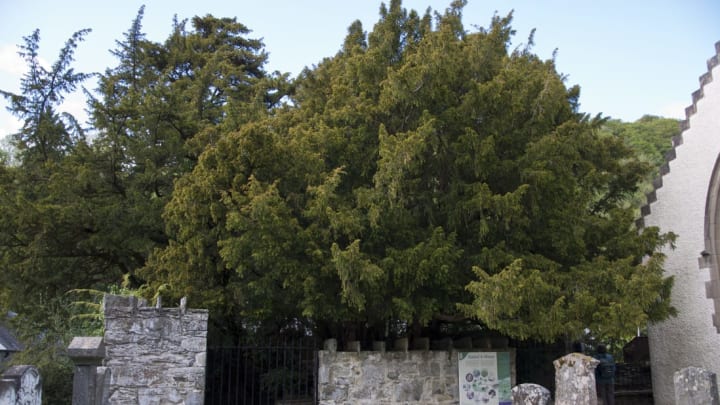The Fortingall Yew in the Fortingall churchyard in Perthshire, Scotland has seen a lot. Since it started growing at least 2000 years ago, it's been present for the Roman settlement of Scotland, the shift from paganism to Christianity, and the country's induction into the United Kingdom. But after standing for millennia, the ancient tree is facing its greatest threat yet. Tourists are removing twigs and branches from the tree to take home as souvenirs, and the tree is under so much stress that it's spontaneously changing sexes, Atlas Obscura reports.
Because of how the tree grows, it's hard to date the Fortingall Yew precisely. It comprises several separate trunks that have hollowed out over the years, making it easier for the tree to support itself in its old age. Based on historical measurements and 19th-century ring counts, the yew has been around for at least two millennia, but it could date back as far as 5000 years. That makes it the oldest tree in Britain and one of the oldest living things in Europe.
That impressive title means the tree gets a lot of visitors, not all of whom are concerned with extending its lifespan even longer. A stone and iron wall built in the Victorian era encloses the tree, but that hasn't stopped people from climbing over it to break off pieces or leave behind keepsakes like beads and ribbons.
As the abuse adds up, the tree has responded in concerning ways. It sprouted red berries this spring, a sign that the tree is transitioning to a different sex for the first time in its life. Yew trees are either male or female, and sex changes among the species are incredibly rare and misunderstood. Some botanists believe it's a reaction to stress. The change may be a survival mechanism intended to increase the specimen's chances of reproducing.
Scientists aren't sure why this particular yew, which was formerly male, sprouted berries on its upper branches, an exclusively female characteristic, but they've collected the berries to study them. The seeds from the berries will be preserved as part of a project to protect the genetic diversity of yew trees across the globe.
In the mean time, caretakers of the Fortingall Yew are imploring visitors to be respectful of the tree and keep their hands to themselves.
[h/t Atlas Obscura]
